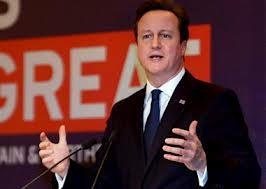
Mumbai, Feb 19: In a measure to attract more Indian businessmen and students, British Prime Minister David Cameron on Monday announced a same-day visa service for investors and no limit on the number of students from the country.
“We have the biggest visa operations anywhere in the world right here in India. I announce that we are going to introduce for businesses a ‘same-day visa’ service to those who want to come and invest in our country,” Cameron said at a business meeting held in the Taj Mahal Palace Hotel here.
Cameron said he wanted UK companies to help India develop new cities and districts along a 600 mile (equivalent of 1,000 km) corridor between Mumbai and Bangalore, generating investment projects worth up to $25 billion.
“With me I’ve got architects, planners and finance experts who can work out the complete solution. It would unleash India’s potential along the 1,000 km corridor from Mumbai to Bangalore, transforming lives and putting British businesses in prime position to secure valuable commercial deals,” said Cameron in an interaction with the staff of Hindustan Unilever, the Indian unit of Anglo-Dutch FMCG major Unilever.
Cameron is on a 3-day visit to India with the largest trade delegation taken abroad by a British PM to date, saying he wanted UK firms to work with both the Indian and British governments to develop nine districts to link India’s financial capital Mumbai with its tech hub Bangalore.
He said India should open up its markets to allow foreign direct investment in hitherto closed sectors. Cameron is gung ho over the Mumbai-Bangalore corridor project while forecasts from his office showed that 5.8 per cent of India’s population growth would be in the corridor, contributing 11.8 per cent of the country’s gross domestic product growth by 2020.
Cameron’s office said British and Indian officials had been working with business representatives from the two countries on the Mumbai-Bangalore project since last year and had produced an initial assessment of its scale and potential.
Accordingly, the first phase of the project would involve investment in physical infrastructure, such as transport networks, telecommunications and power generation.
Later construction would concentrate on social infrastructure such as welfare and education. India has pushed the building of giant development “corridors” to accelerate the growth of its manufacturing base, which has lagged behind its IT and services industry.
The government has also planned to build 24 new industrial cities along a 1,483 km (920 mile) railway line between New Delhi and Mumbai with Japanese funding, but the project has progressed slowly.
Meanwhile, the UK government would be willing to co-fund a feasibility study, on a match funding basis, with the Indian government costing up to 1 million pounds ($1.55 million). By 2030, if realised, the project could generate close to half a million jobs, while indirect jobs could bring the total in the region to two million, Cameron's office said.
“Our initial scoping work suggests that accommodating the 3-4 million people attracted to each of the new cities would require close to 1 million new homes, up to 120 schools, 10 colleges and hospitals,” the office said. Meeting with corporate India this evening here, Cameron announced same-day visa services and said there would be no limit on the number of students from here studying in Britain and also no cap on the length of time they can stay and work in graduate-level jobs after they qualify in his country.
He made a similar announcement with regard to businessmen visas saying: “....we are going to introduce for businesses a same-day visa service for those who want to come to our country and invest...”
Cameron will fly to Delhi tomorrow for talks with Prime Minister Manmohan Singh on a range of issues.








Comments
Add new comment